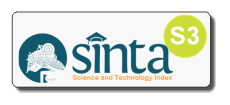Psychological Empowerment and Change Self-Efficacy As Mediators Between Change Leadership and Affective Commitment to Change
Abstract
Full Text:
PDFReferences
Aamodt, M. G. (2015). Industrial/Organizational Psychology: An Applied Approach (8th ed.). Boston: Cengage Learning.
Aggarwal, J., & Krishnan, V. R. (2013). Impact of Transformational Leadership on Follower’s Self-efficacy: Moderating Role of Follower’s Impression Management. Management and Labour Studies, 38(4), 297–313. https://doi.org/10.1177/0258042X13513129
Ashford, S., Edmunds, J., & French, D. P. (2010). What Is the Best Way to Change Self-Efficacy to Promote Lifestyle and Recreational Physical Activity? A Systematic Review With Meta-Analysis. British Journal of Health Psychology, 15(Pt 2), 265–288. https://doi.org/10.1348/135910709X461752
Bandura, A. (2015). On Deconstructing Commentaries Regarding Alternative Theories of Self-Regulation. Journal of Management, 41(4), 1025–1044. https://doi.org/10.1177/0149206315572826
Batti, R. C. (2014). Human Resource Management Challenges Facing Local NGOs. Humanities and Social Sciences, 2(4), Article 4. https://doi.org/10.11648/j.hss.20140204.11
Casalderrey, O., & Prathama, K. (2021). Digital Donations—New Potential to Accelerate Philanthropy. The Jakarta Post. https://www.thejakartapost.com/academia/2021/03/05/digital-donations---new-potential-to-accelerate-philanthropy-.html
Ergeneli, A., Gohar, R., & Temirbekova, Z. (2007). Transformational Leadership: Its Relationship to Culture Value Dimensions. International Journal of Intercultural Relations, 31(6), 703–724. https://doi.org/10.1016/j.ijintrel.2007.07.003
Fatima, M., Riaz, A., Mahmood, H. Z., & Usman, M. (2020). Linking Employees’ Change-Related Self-Efficacy, Change Readiness and Commitment to Change. Pakistan Journal of Commerce and Social Sciences, 14(1), 334–367. http://jespk.net/paper.php?paperid=4390
Foks, M. (2015). Antecedents of Commitment to Change: A Study About the Contribution of Change Related Variables, Individual Variables, Communication Variables and Work-Relationships to Employees’ Commitment to Organizational Change [Master’s thesis]. University of Twente.
Fugate, M., Prussia, G. E., & Kinicki, A. J. (2012). Managing Employee Withdrawal During Organizational Change: The Role of Threat Appraisal. Journal of Management, 38, 890–914. https://doi.org/10.1177/0149206309352881
Gravetter, F. J., & Forzano, L.-A. B. (2013). Statistics for the Behavioral Sciences (13th ed.). Boston: Cengage Learning.
Gravetter, F. J., & Forzano, L.-A. B. (2016). Research Methods for the Behavioral Sciences (4th ed.). Boston: Cengage Learning.
Hayes, S. (2020). Acceptance and Commitment Therapy: Principles of Becoming More Flexible, Effective, and Fulfilled. Louisville: Sounds True.
Herold, D. M., Fedor, D. B., Caldwell, S., & Liu, Y. (2008). The Effects of Transformational and Change Leadership on Employees’ Commitment to a Change: A Multilevel Study. The Journal of Applied Psychology, 93(2), 346–357. https://doi.org/10.1037/0021-9010.93.2.346
Herscovitch, L., & Meyer, J. P. (2002). Commitment to Organizational Change: Extension of a Three-Component Model. Journal of Applied Psychology, 87(3), 474–487. https://doi.org/10.1037/0021-9010.87.3.474
Holten, A.-L., Hancock, G. R., & Bøllingtoft, A. (2019). Studying the Importance of Change Leadership and Change Management in Layoffs, Mergers, and Closures. Management Decision, 58(3), 393–409. https://doi.org/10.1108/MD-03-2017-0278
Jaiswal, D., & Dhar, R. L. (2016). Impact of Perceived Organizational Support, Psychological Empowerment and Leader Member Exchange on Commitment and Its Subsequent Impact on Service Quality. International Journal of Productivity and Performance Management, 65(1), 58–79. https://doi.org/10.1108/IJPPM-03-2014-0043
Kaplan, R. M., & Saccuzzo, D. P. (2017). Psychological Testing: Principles, Applications, and Issues. Boston: Cengage Learning.
Lim, S. Y., Lo, M.-C., Mohamad, A. A., Suaidi, M. K., & Ramayah, T. (2021). Factors Affecting Employee Commitment to Change in Malaysia Service Organizations: The Moderating Impact of Organization Culture. Estudios de Economia Aplicada, 39(1), Article 1.
Ling, B., Guo, Y., & Chen, D. (2018). Change Leadership and Employees’ Commitment to Change: A Multilevel Motivation Approach. Journal of Personnel Psychology, 17, 83–93. https://doi.org/10.1027/1866-5888/a000199
Liu, Y. (2010). When Change Leadership Impacts Commitment to Change and When It Doesn’t: A Multi-Level Multi-Dimensional Investigation [Doctoral dissertation, Georgia Institute of Technology]. https://smartech.gatech.edu/handle/1853/33856
Mangundjaya, W. L. (2019). Leadership, Empowerment, and Trust on Affective Commitment to Change in State-Owned Organisations. International Journal of Public Sector Performance Management, 5(1), 46–62. https://doi.org/10.1504/IJPSPM.2019.096687
Mangundjaya, W. L. (2022). Pemimpin Perubahan Lintas Budaya. Banyumas: Wawasan Ilmu.
Mangundjaya, W. L., & Giovanita, D. (2018). Transformational Leadership, Change Self-Efficacy on Affective Commitment to Change, in Banking versus Insurance Industries. Advanced Science Letters, 24(1), 497–499. https://doi.org/10.1166/asl.2018.12049
Naotunna, S., & Arachchige, B. (2016). Perceived Organizational Support and Non-managerial Employees’ Commitment to Change in Sri Lankan Apparel Firms. South Asian Journal of Human Resources Management, 3(1), 40–57. https://doi.org/10.1177/2322093716637167
Ng, T. W. H., & Lucianetti, L. (2016). Within-Individual Increases in Innovative Behavior and Creative, Persuasion, and Change Self-Efficacy Over Time: A Social-Cognitive Theory Perspective. The Journal of Applied Psychology, 101(1), 14–34. https://doi.org/10.1037/apl0000029
Nunnally, J. C., & Bernstein, I. (1994). Psychometric Methods (3rd ed.). New York: McGraw-Hill.
Packard, T. R. (2012). Organizational Change in Nonprofit Organizations: Implications for Human Resource Management. In Human Resource Management in the Nonprofit Sector: Passion, Purpose and Professionalism (pp. 221–240). Northampton: Edward Elgar Publishing. https://doi.org/10.4337/9780857937308.00017
Puspitasari, D. A., & Mangundjaya, W. L. (2019). Leader–Member Exchange and Affective Commitment to Change: Mediating Role of Change Self-Efficacy. 60–65. https://doi.org/10.2991/assehr.k.200407.011
Robbins, S. P., & Judge, T. A. (2013). Organizational Behavior (15th ed.). Upper Saddle River: Pearson Education Limited.
Spreitzer, G. (2007). Giving Peace a Chance: Organizational Leadership, Empowerment, and Peace. Journal of Organizational Behavior, 28(8), 1077–1095. https://doi.org/10.1002/job.487
Stouten, J., Rousseau, D. M., & de Cremer, D. (2018). Successful Organizational Change: Integrating the Management Practice and Scholarly Literatures. The Academy of Management Annals, 12(2), 752–788. https://doi.org/10.5465/annals.2016.0095
Wanberg, C. R., & Banas, J. T. (2000). Predictors and Outcomes of Openness to Changes in a Reorganizing Workplace. Journal of Applied Psychology, 85(1), 132–142. https://doi.org/10.1037/0021-9010.85.1.132
DOI: http://dx.doi.org/10.17977/um023v12i12023p9-115
Refbacks
- There are currently no refbacks.
Copyright (c) 2023 Jurnal Sains Psikologi

This work is licensed under a Creative Commons Attribution 4.0 International License.
Reference Manager :
|
Aliansi:
Plagiarism Checker :
This work is licensed under a Creative Commons Attribution 4.0 International License.



1.png)








